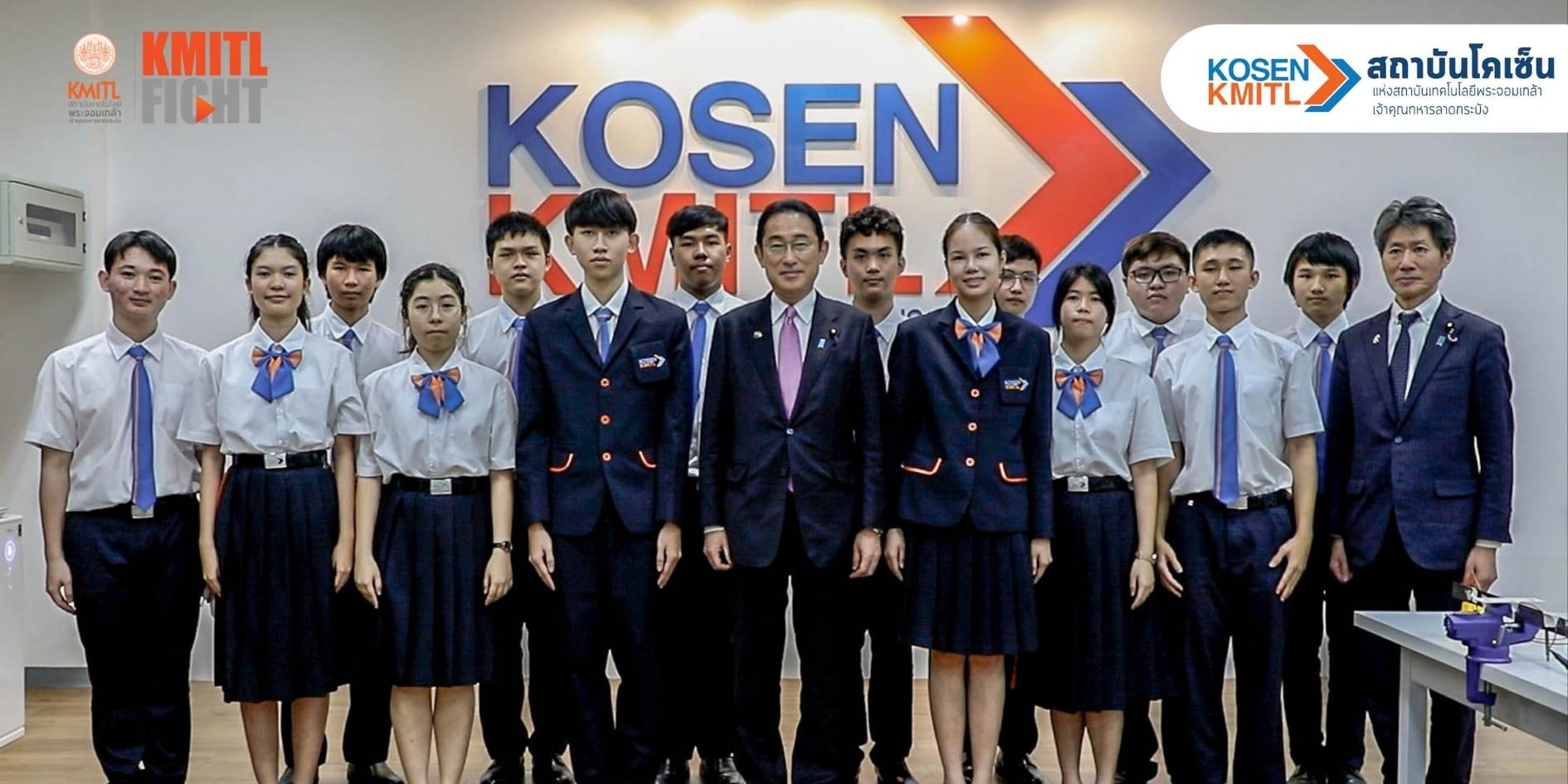KOSEN Institute of King Mongkut's Institute of Technology Ladkrabang
(KOSEN - KMITL)

The KOSEN Institute of King Mongkut's Institute of Technology Ladkrabang (KOSEN - KMITL) or the KOSEN Institute of KMITL is an educational institution established under the Human Resources Development Project in Engineering, Technology, and Innovation. The institute supports investment and enhances the capabilities of the industrial sector in the country and region. It was established according to the Cabinet resolution on December 4, 2018, with the Office of the Basic Education Commission and the Institute for the Promotion of Teaching Science and Technology being responsible for the project as proposed by the Ministry of Education.
The Human Resources Development Project in Engineering, Technology, and Innovation aligns with the Thailand 4.0 policy, which supports investment and enhances the capabilities of the industrial sector in the country and region, especially in the Eastern Economic Corridor (EEC). It also focuses on developing human resources in science, technology, and innovation with high knowledge and potential to play a key role in promoting targeted industries, both existing and future industries. Moreover, it is an essential part of driving the country with innovative and creative advancements. In addition to increasing the number of quality personnel in the group of practical engineers to meet demand, the project can also attract foreign companies, such as from Japan, to invest more in Thailand. Therefore, the Thai government has signed an agreement with the Japanese government under a Japanese government loan project that provides assistance and support in education and academics to achieve the set objectives.
The KOSEN Institute of KMITL is overseen by the Thai-KOSEN Institute, with a minister serving as the chairman of the executive board to ensure that operations comply with the agreements between the Thai and Japanese governments. However, to ensure that the operations of the KOSEN Institute of KMITL comply with the Higher Education Act, King Mongkut's Institute of Technology Ladkrabang has established the KOSEN Institute of KMITL as a department within the institute, under the supervision of the KOSEN Institute's executive board.
Moreover, to ensure that the academic operations of the KOSEN Institute of KMITL align with the objectives approved by the Cabinet, King Mongkut's Institute of Technology Ladkrabang has entered into a cooperation agreement with NIT (National Institute of Technology) Japan to develop the curriculum of the KOSEN Institute of KMITL to align with the MCC (Main Core Curriculum), which is the core curriculum of the KOSEN Institutes in Japan. To ensure that the teaching and learning of the KOSEN Institute of KMITL follow the set curriculum, NIT has sent expert faculty members to serve as models and to prepare and develop Thai faculty members to gain experience and expertise in mathematics, science, engineering, and technology according to the KOSEN model in Japan.
Diploma in Engineering
- Mechatronics Engineering (Started in 2019)
- Computer Engineering (Started in 2021)
- Electrical and Electronics Engineering (Starting in 2023)
Bachelor's Degree in Engineering
- Advanced Innovation Engineering (Starting in 2024)
Admission Policy
Students should possess the following qualifications:
- Proficiency in mathematics, science, and English.
- Interest in practical work, assembling things, and the desire to become inventors, engineers in robotics / mechatronics / computer engineering / electrical and electronics engineering.
- Ambition to create new technologies/systems.
- Desire to become a global inventor/engineer.
Certificate Policy
Graduates will possess the following abilities:
General Education
- Knowledge in science and engineering and the ability to apply practical skills to solve societal problems.
- A well-rounded personality with knowledge and understanding of Thai history, culture, society, and patriotism.
- Ability to understand global issues and communicate in English, Japanese, and Thai with others.
- Creativity to create new value by integrating knowledge from various fields.
- A mindset to work with awareness of the roles and responsibilities of engineers towards society to create a better society.
Mechatronics Engineering
- Ability to design, present, and develop robotic/mechatronics systems to solve specific problems.
- Ability to design, present, and develop electrical and electronic systems for robotic/mechatronics systems.
- Ability to design, present, develop, and solve mechanical systems for robotic/mechatronics systems.
- Ability to design and develop software for controlling robotic/mechatronics systems.
- Ability to design, present, and develop network systems to control robotic/mechatronics systems.
Computer Engineering
- Ability to use and manage computer software and hardware.
- Ability to understand operating systems and develop software to solve specific problems.
- Ability to design, present, and develop IoT (Internet of Things) systems.
- Ability to understand computer network systems and maintain the security of computer server networks and connected devices.
- Ability to use advanced technologies (such as Artificial Intelligence (AI), Big Data, etc.) to create computer systems that support societal development.
Electrical and Electronics Engineering
- Ability to design, present, and develop electrical and electronic systems to solve specific problems.
- Ability to design, present, and develop smart electrical energy systems for sustainable development.
- Ability to design, present, and develop software to operate electrical and electronic systems.
- Ability to design, present, and develop intelligent systems connected to networks for practical use in smart cities and production systems.
- Ability to design, present, and implement infrastructure for energy management.
